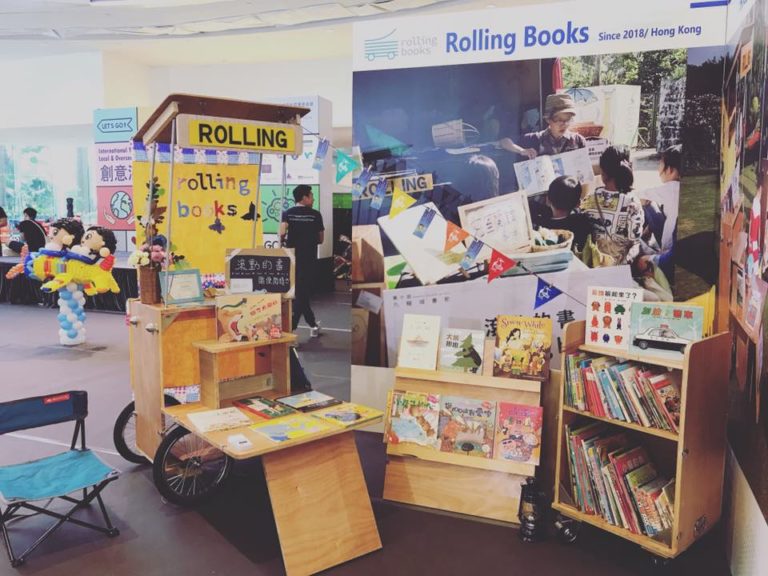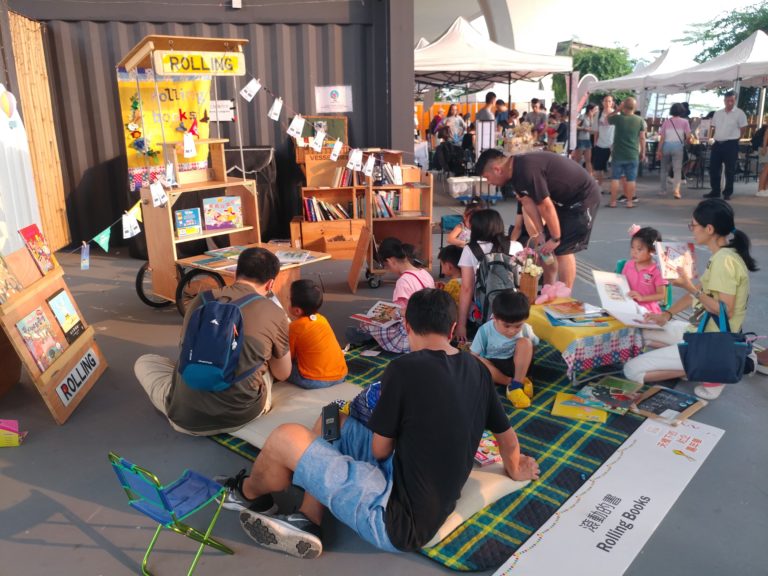What is Rolling Books
什麼是滾動的書



Rolling,閱讀的永恆體驗,滾動中⋯⋯
Rolling Books是推廣閱讀體驗的社會企業。我們透過靈活貼地的流動概念書車,將閱讀推廣的有趣點子,駛進小學校園並關愛社區。透過舉辦各式活動把閱讀樂趣轉化成真摰體驗,讓小朋友建立終生的閱讀習慣。我們也通過與各類型機構合作試驗創新的閱讀項目,推廣可持續發展的知識,擴大閱讀推廣的影響力,重新建造閱讀體驗的新形態。我們深信,閱讀除了為獲取知識、向上流動外,也能讓讀者學習面對獨處與提升抗逆力。
為兒童提供平等的自主閱讀機會亦是我們的目標之一,相關工作包括︰收集童書轉贈至基層家庭手中,為少數族裔兒童提供中文學習支援,甚至出版設有點字及口述影像的多感官繪本等。我們將繼續致力以不同的切入點,努力推動閱讀平等。
Rolling Books is a social enterprise to promote reading experience. With the concept of mobile pop-up libraries and events, we are bringing interactive and engaging reading activities to schools and caring communities, aiming to inspire children to seek their lifelong companionship with books. We partner with a diversity of organisations for innovation projects to promote reading accessibility and sustainable knowledge, aiming to connect a new generation of readers in the challenging digital age.
滾動的書有限公司獲資助項目:
-「滾動知識車」:社創基金 2018-2019
-「海洋廢物:未來的考古說明書」:世界自然基金會香港分會主辦「藍海守護者種子計劃 」 2019-2020
-「滾動對話」:香港中文大學尤努斯社會事業中心「社創領袖獎」得獎者(第一名) 2018-2019學年
-「滾動對話:少數族裔及基層婦女社區賦權」:Oxsitis逆の女2020慈善名額(受惠機構:民社服務中心;協力 : 妳想煮意)2020-2021
-Books for asylum seekers children: Sustainable Development Goals Action Fund, The Campus Planning and Sustainability Office, CUHK (Founder as the Awardee) 2020
– Multisensory Reading Experience: Operation Santa Claus/UBS NGO Leadership Programme 2019 (Champion) (collaborated with Audio Description Association (Hong Kong)) 2020-2021
-「南涌廚房書房」:為「滙豐永續鄉郊計劃」轄下「鄉郊初創培育計劃」的一部分。
「滙豐永續鄉郊計劃」由香港大學公民社會與治理研究中心永續坊策劃,並由滙豐支持。2020-2021
-「滾動對話:雲上的童書故事」:社創基金 2020-2021
滾動的書(或成員代表)也曾參與以下項目/培訓/社群/嘉許:
-Good Seed (Institute for Entrepreneurship and Jockey Club Design Institute for Social Innovation of The Hong Kong Polytechnic University.) 2018
-OSC/UBS/CUHK NGO leadership Programme 2019
-Jockey Club MEL Institute Project Certificate Training Course cum Mentored Practicum 2019-2020
-Esperanza薯片叔叔共創社 2019
-Associate Member, Pre-Incubation Centre, The Chinese University of Hong Kong 2019-2020
-Asian Charity Services, SPRINT: Hackathon for Social Good 2019
-American Express Leadership Academy (Common Purpose) 2019
-HK Goodpost 2019-
-Social Justice Fellowship Program, Resolve Foundation 2020
-科創社工學會 科技與創新社會工作培訓課程 2020
-優秀社企員工:霍穎婷,社企員工嘉許計劃 2020
-社區投資共享基金「社會資本動力獎 ─ 標誌獎」2020
-Essential Guide to Effective Arts Management: Law, e-Marketing, Public Relations and Cultural Programme Development, HKAAA 2021
-豐盛社企學會「賽馬會豐盛社會效益量度培訓計劃」2021
-Virtual Learning Series: Supporting Social Enterprises Navigating COVID-19 (the British Council, AVPN, and the Social Enterprise Academy) 2021
-Impact Circles Mentorship 2021
滾動的書有限公司獲香港社會企業總會頒受SEE Mark【創啟級】社企認證。

機構願景Vision
透過持續推廣不同的閱讀體驗,我們願景重新連結書本知識、生活素質及自然環境。
The Promotion of Reading Experience to re-connect people with knowledge, lifestyle, and the nature.

機構使命Mission
藉著一系列創新的閱讀活動及工作坊,我們鼓勵學生及社區人士透過閱讀增長知識,以及增強抗逆力應對變幻無常的社會狀況。
Through a variety of innovative events and workshops relating to reading, we aim to engage students and community members to enrich knowledge and to be resilient to the ever-changing society.

關注議題Focus area
- 推廣閱讀作為體驗的旅程
- 可持續發展閱讀的倡議
- 關注跨代貧窮的成因
- 推動抗逆力應對社會狀況
- Promotion of reading experience
- Sustainability and Reading
- Understanding inter-generation poverty
- Building resilience for the changes in society

感謝No Pasa Nada對Rolling Books進行了深度訪談,對Rolling Books的面貌進行了全方位多角度的呈現。
Rolling Books如何從以閱讀為載體的創新實驗中孵化? 我們何以與閱讀相關,又不僅僅只與閱讀相關? 我們因何走上社會創新的路途? 我們希望透過閱讀為基層及少數族裔孩童帶來怎樣的幫助? 我們在疫情中又有怎樣的思考及應對措施?在未來,Rolling Books又將如何迎接新的挑戰,帶來怎樣的閱讀新趨勢呢?
Rolling Books誠邀大家與我們及No Pasa Nada一起回顧滾動路途上的點滴,一同展望未來,期待更多更有能量的滾動。
Rolling Books在No Pasa Nada的詳細訪談紀錄:
Rolling Books is a social enterprise based in Hong Kong that aims to promote the reading experience. They simultaneously work with social issues including poverty alleviation of minority groups, marine pollution, and women’s empowerment.
James ran a bookstore 15 years ago, when it was not common in Hong Kong to have social activities within bookstores.
James: Let’s talk about books. 15 years ago, I opened a bookstore. I ran an upstairs bookstore [in Hong Kong, the bookstores that are not visible on the ground level are called upstairs bookstores (樓上書店)] for five years, and in the end I had to leave the business. That time period for me was a big change for me, because we created a positive impact to the bookstore industry in Hong Kong. There are many upstairs bookstores and independent bookstores today but 15 years ago, we managed a lot of events and did some art exhibitions and we have had concerts in our bookstore many times and we had theater performances, too. I have done all the crazy and the strange things in that bookstore. The experience at the bookstore was very interesting and it allowed me to think that I can use books as a medium, and I can use books to do a lot of art and cultural related activities.
During that time, we had a lot of media interviews: from Hong Kong, from mainland China, and we would have some Japanese media who interviewed us. It was because we opened a new style of bookstore. Because this was 15 years ago, and at that time the bookstores were just selling books. Bookstores were not about activities. Of course, during that time Taiwan’s Eslite Bookstore had also opened and they would do a lot of activities. Hong Kong didn’t have a lot of these kinds of bookstores. I used this bookstore in Hong Kong to do a lot of activities and because I have studied art management, I would be able to pull a lot of art-related activities into my bookstore. It was funny that in our bookstore, we hosted many concerts. Many independent musicians didn’t have a place to produce CDs, and they didn’t have people who would want to do their concerts. We would work as organizers and producers to make concerts possible, for example at an art center, or in Macao. We would use the name of a bookstore to do this. We also made a CD, by the way, called Invisible Cities. We organized a bunch of local musicians to make a CD.
We attracted attention into the norms of bookstore operation in five years; we did a lot of different experiments to allow people to have a new imagination, that if you run a bookstore, you can do all kinds of things. As for choosing books, we also chose very well. With these activities, the bookstore was quite popular.
The problem was, we were popular but that didn’t mean we could sell many of our books. For us who sells books, we will choose books that are not popular, like best sellers. We chose very good and rare books, and people were satisfied that in Hong Kong there is this kind of bookstore, but does that mean the bookstore can sell a lot of these books? No, that doesn’t mean the bookstore can sell a lot of these books. Would you be able to regularly sell books? No, not a lot—well, it’s not enough. We did sell some books, but it wasn’t enough revenue to continue. In Hong Kong, the rental fees are expensive. I was in Causeway Bay that time, which was an expensive district, and I couldn’t this bookstore eventually.
After leaving his bookstore, James never left reading aside. He organized running book clubs in which members would run together, and then read.
James: After the bookstore closed, I started working in other commercial organizations, but eventually I went to Oxfam Hong Kong NGO. The experience at the NGO was also very important to me. Because I have studied art management, when I went to Oxfam to work, I used my knowledge on arts management in Oxfam. In Oxfam, I wasn’t working directly working on policy related issues; at Oxfam, I was working with public education. I was basically using the knowledge on arts management for the work on public education.
After I worked at Oxfam for a couple of years, I would look back into my own experience. I was thinking what I could do with my knowledge on books, because even though I didn’t open a bookstore, there were many interesting stories in between. For example, when I had time, I did something called a Running Book Club. It’s a combination of reading and running. That was just something I did on the side; it wasn’t a business. I organized around 50 times of this running book club: I would provide a theme and people would choose a book, and in some district, we would run, and we would have a reading club.
Yes, it is a very strange thing. For instance, our running path would start from Yau Ma Tei Theatre and we run to Xiqu Center. Yau Ma Tei Theatre hosts Cantonese opera and Xiqu [traditional Chinese theatre] Center was built by West Kowloon Cultural District Authority. Then, we would run back to Yau Ma Tei Theatre. In this process, we are able to know the things about the Yau Ma Tei district, and we are able to see that at Yau Ma Tei Theatre they do Cantonese shows and that Xiqu Center is a new point of Xiqu. After we ran, we will go back to Yau Ma Tei Theatre to do our book club. During book club we will each share a book about Xiqu or about the Yau Ma Tei district We did this many times. When I finished this, I asked myself why was I able to do this? Because I opened a bookstore before and I knew a lot of people in the cultural industry and writers, and therefore I was able to successfully do things that are about books, and hence, the success at the running book club. That time I thought, was it still possible for me to use my knowledge on books to contribute and do some more things? But I was very sure I was not able to open another bookstore. If I open a bookstore again, it probably will close down again. So, I will not open a bookstore. I didn’t figure out the answers then, just yet.
I was always participating in social innovation incubator programs and in Hong Kong there are many of these programs. They mainly want to find university students to participate. They allow the students to participate and go through social innovation and design thinking—an incubator program, and they support you to start a business. There are some only for university students, but some are open for all without age limitations. I thought this would be good for me, and when I finished taking the course of an incubator program, I had to pitch an idea. I wanted to do something that had to do with promoting reading, and because of the time I had spent in Oxfam working with poverty alleviation, I was thinking if there were ways I could combine books and poverty alleviation together. This incubation program was under a funding called SIE fund, a funding from Hong Kong, and it was also involved with poverty alleviation. It was only a project that I had to do for the end of this course. There came the idea of Rolling Books, meaning we use a car to go to different places and I pitched that idea and that idea was accepted, so they gave me the funds. I started thinking if I wanted to do this full-time. I could choose not to do it. I could choose to stay in Oxfam. But I thought maybe it was time that I could try to work on this project as an entrepreneur and continue. This is how I put books and social enterprise together.
The NGO and the social enterprise work differently in terms of their business model. James chose the social enterprise and discusses Rolling Books’ income sources.
James: Why did I choose a social enterprise and what is the difference between that of a NGO [non-governmental organization] and a social enterprise? The work I am doing now is related to the work I did before at Oxfam, especially in the context of poverty alleviation, but there is a vision I have for social enterprise. In NGO they use fundraising as their business model, meaning people donate money, but a social enterprise is not going to rely on donations, because there has to be a business model. The logic is, when I do this business, I also have a social good. I think this concept of a social enterprise compared to that of the NGO fundraising model, is worth exploring. Because in a social enterprise, you hope that you can maintain under conditions in which you have no funds, you can run your business, and this business can contribute to social good. Social enterprise is the new trend, although we are still focused on NGOs right now. If we are able to change the trend to focus on social enterprise, then instead we will explore more possibilities and work more dynamically to change or alleviate the problems in society. I think concept-wise, this is why I want to do social enterprise. This is a very long-term process, because I am still receiving a lot of funding, and you know that if I receive funding it’s very difficult to say that this is a social enterprise because besides government funding, other foundations give us money to let us work.
Every time I receive funding, I hope that the funding will slowly allow me to run a sustainable business. Yes, we are receiving a lot of funding at this stage, but hopefully this business will sustain itself, so that we don’t need to depend on funding or on the government in the future. This will be more of a long-term goal. I could have opened an NGO, it’s very easy to do so, but I have chosen a social enterprise.
Rolling Books has very income streams. One is with activities in school. In schools, we are their service providers: they may need some event in some space, and we will do activities in that space. There will be some revenue there. There will be also some revenue from the online bookstore, but only very little. The other source of revenue is the parent-children activities which we can’t do these months because of the protests and COVID-19. We can make money from parent-children activities. For parents who can pay for these activities, they may pay to participate in these events. Sometimes in a guided tour, we have 15 quotas, and we may have something like 13 quotas are fee-paying and 2 other quotas would be opened for those from underprivileged families. This is a very classic way: we have done this before, and we can do this in the future.
We also do events at shopping malls. For example, in one shopping mall for a weekend, I was responsible for the market for books and there was also a stage there, and in the three days I would be on the stage and we would host different activities. Generally, we would be telling stories, and sometimes we would have clowns telling stories, sometimes some people would use music to relate to stories. Whatever that is related to reading, we put it on stage. That’s another form of service offering. In some cases, we have received funding and we can work at community centers for free. Honestly, this is a very old-fashioned business model. Very simply, the definition of social enterprise is very flexible; if I was to do something for social good, it would be recognized as a social enterprise, because if I say to people that we do reading promotion, then we can very naturally claim we are a social enterprise. Of course, in the background, there are some regulations but that we won’t go through with so much detail.
Within NGOs, it may be difficult to choose a picture book if they want to convey specific agendas. As a social enterprise, Rolling Books doesn’t face this limitation.
James: I think the agendas that we work on, including poverty alleviation, minority groups, and marine pollution, came out of the time I was working at Oxfam. I learned some things from the bookstore, but not so much in detail because I was not working in an NGO [Non-Governmental Organization]. When I was working at Oxfam, I had a chance to learn these agendas. Issues on ethnic minorities or on human rights with domestic helper’s children, or on climate change is worth pushing for and bring to the children right now. In Hong Kong, many NGOs are very focused in delivering direct messages. Some NGOs may have a wide spectrum of work including advocacy and campaigning. While my work is to promote reading, in my events and in my programs I am able to bring these issues to the families with picture book stories to initiate discussions among them. Generally, for parents and for children, this has a positive impact.
NGOS have to be very formal in delivering their messages. Because they are facing many different types of donors, when they talk about their agenda, they may face limitations at the same time. For example, an NGO recommends a picture book for their public education program and the story within the picture book is very suitable. However, if the picture book contains some elements that may not be relevant to their core messages, then they may not use this picture book because don’t want the public to misunderstand their scope of work. Imagine a picture book about a controversial politician, about how he becomes who he is. The story has lots of reflection about personal growth and justice, it may be a great book, but do you think any NGO would endorse the picture book for the justice and courage story in the book? Probably not. When NGOs have to be accountable for a wider constituency, they need to be very focused on their specific agendas—because their communication department will have to tell you very clearly their agenda, and if there is anything that is not related they cannot produce it in their program. An NGO working on children protection can choose a picture book with a meaningful story, but if the picture book is also about children from same-sex parent families, then maybe the NGO wouldn’t choose to use this book, as to avoid confusion in the message it wants the public to receive.
Reading in Hong Kong is not often thought as particularly social. James aims to make reading a trendy experience.
James: We have a mission statement that says we are promoting the reading experience, so is it just about books? Not necessarily. Is it about story telling? Not necessarily. Rolling Books is involved with anything that has to do with reading. I want people to change the ideas they have about reading. For some people, reading is very academic. In school, reading will be about studying. These are the ideas about reading. Story telling is only a tool we use to facilitate reading. While to some extent the I think the agendas like climate change are very important, I really hope to promote the reading experience. When everybody has changed their mind on the reading experience, it will be easier to do reading promotion. Through our programs, through our selection of books, through our processes of story-telling, we can tell our agendas. Agendas are the by-products, we can use these opportunities to tell people about these stories. The most important thing for us is to change the reading experience. Because in Hong Kong we say things like, well, there’s a lot of people reading books so why can’t the bookstores sustain themselves?
The reading experience is not trendy. People think reading is outdated; if you go to movies, you will go with your friends, if you have a fashion show or something trendy you will go, or if your friends play the game Animal Crossing, you will play the game too—such things are trendy. The problem is, why can’t reading do that? Because reading is not trendy. Is there some way we can allow everyone to feel reading is a trendy thing? What makes the reading experience special? I like to read books, but the more important thing is how do I invite people who do not like to read, to like to read as well? I am not trying to introduce a book to you, which a lot of people are doing, but instead I want to continuously think in the concept of rolling books: how do I promote the reading experience so it allows people to think that there are many different ways to read? I gave an example of running book club, is that a way to reimagine it? Can you imagine, after running and all sweaty, and we start to read books?
These are the things that we want to break on the stereotypes of reading. I can do a hiking books club, meaning I hike up the mountain and then read a book at the peak, no? People always think that reading books is about reading indoors. Can I suggest an outdoor reading? Outdoor reading is actually an environmentally friendly thing no? We don’t need to turn on lights. You can have some cool breeze, and the whole thing can feel very comfortable. We don’t have a lot of people talking about outdoor reading. How do I eventually promote the reading experience? It won’t be in one event or something that allows me to do this. Maybe through similar activities, we would be able to slowly spread this idea on the reading experience. Following the name Rolling Books, we hope there is a car that brings the books out to the people. Some says that the public library does something similar, but we are trying to do something very different from the public library.
Ethnic minorities children are susceptible to intergenerational poverty in Hong Kong, because the education system prioritzes Chinese [Cantonese].
James: Intergenerational poverty is very difficult to talk about and to work on. If we are talking about intergenerational poverty, it definitely isn’t something that we can fix in the short-term. It also hasn’t been a lot of time since we started. Honestly, if we are talking about intergenerational poverty, we can only find the obvious features of intergenerational poverty. We are just starting to try to fix this. We can outline what is intergenerational poverty: the most obvious example is the intergenerational poverty among ethnic minority children. In Hong Kong, ethnic minority children are learning Chinese [in Hong Kong, people refer to Cantonese when speaking about Chinese], but you can imagine ethnic minority children, or especially Southeast Asian children who learn Chinese face a lot of difficulties. Because in Hong Kong, the schools assume that Chinese is your first language. When you go home, you are expected to go home and listen to your family talk in Chinese, but for the ethnic minorities, the schools teach Chinese as the first language, but when they go home, they find that nobody is able to support them or speak with them in Chinese and nobody can teach them Chinese characters. For ethnic minority children, learning Chinese is very difficult. The typical social problem is that when they have to find work when they are older, if their Chinese is not good they will end up in the 3D work: dirty, dangerous, and demeaning. For example, they may work in security, as a dishwasher, or in manual labor. If ethnic minority children do not learn Chinese well, when they are older, they will continue to work in the 3D work. They won’t be able to leave the poverty. This is the typical symptom of intergenerational poverty. In Lai Chi Kok [a district in Hong Kong], I am doing a series of using story books to encourage ethnic minorities children to read, and to have volunteers to read with them to allow them to learn more Chinese. This is one of the ways we try to fix intergenerational poverty.
The parents of ethnic minority children are very clear that they would like their children to learn Chinese well for them to be able to do their homework. While us Chinese children we want the best grade, at some point the ethnic minority children fall behind so much on Chinese that the ethnic minority families are already quite happy if their children can catch up on their basic homework skills. I would think homework is important for them, not because of the grade. For ethnic minorities children, the question is how can they can do their homework, and can they catch up? Because if they don’t understand Chinese in the first place, then in their whole school year they won’t understand. In the following year, they won’t understand another level of Chinese either. The gap is only wider. The concern is that a lot of homework is taught in Chinese. In school, Chinese is not one subject. Maybe there are 8 subjects at school, and 6 of them are taught in Chinese. So why is Chinese so important? Because if you don’t understand Chinese, it doesn’t mean only your Chinese subject is bad. You are going have difficulty understanding maybe in math class, and maybe your life education class [class on social knowledge], and a series of problems will result.
Among low-income families, parents have less time with their children and children are more likely to be exposed to the digital world.
James: Within Hong Kong’s NGOs, the question on how we interact with new immigrant families from mainland China is very difficult. Partly because of the cultural difference, and partly because if we talk about new immigrant families in Hong Kong, there are less support from the public due to the anti-mainland China sentiments. There are some things we want to do, which were quite difficult in the beginning when I tried targeting reading with new immigrant families. For instance, the parents’ expectations were different, because they hoped that I teach children to read more books from school, so that the children can do better in their homework, so that their academics are better: the parents cannot perceive that reading is something outside of the classroom. Doing reading promotion does benefit us because parents do like the idea; if we tell them we are doing something like playing video games like Minecraft, they may not be so interested, but Minecraft definitely has its own learning, too. My advantage is that I do reading promotion and the parents will be eager. At the same time, the disadvantage is that the children may think this will be boring. The challenge for us is while the children first come to us thinking reading will be boring, through our activities they will think that this is instead, fun.
The children of immigrant families do not necessarily need to improve their Chinese, because you know the Chinese of new immigrant children from mainland China is going to be better than that of ethnic minority children. If I have programs for ethnic minority children to learn Chinese, I use storytelling through which they can learn Chinese, and if I can add some Chinese children, these children will be also encouraged to like to read books more. My point is that I want them to like to read books more. This can allow them to change the idea of reading. This is a more long-term goal.
For example, we have organized a Kowloon City area tour, which everyone does and it doesn’t sound that special, like if we go to Hau Wong Temple we introduce Hau Wong Temple, if we go to Sung Wong Toi we introduce Sung Wong Toi, but during the tour, I would relate every location to a book. We walk to To Kwan Wan [a district in Hong Kong], and there are many old buildings there, and in one area, there are many partitioned rooms [a feature typical in Hong Kong]. I might not bring the children up to the partitioned rooms, but I will take out a book about Hong Kong partitioned rooms to tell them a story about partitioned rooms. This will allow them to relate to these books, that there are some real stories in books, because a lot of children think that stories in the books do not exist in the reality and they cannot relate to it. Even as we pass by a firefighter’s station, I will take out a picture book about firefighters’ station and after they hear the story, the children will remember that in the book there is a little firefighter living in this place, and they may be able to relate that there are many real stories from books. This will hopefully motivate them to like reading more. For new immigrant families and local families, if they are motivated to read more books, then they are more able to explore their own interests and it’s not going to be just about academics. If they have a space to explore their own interests, they will not need to stay with the the idea that only through academics, they are able to change their lives. They can self-learn from books other things and may find their own directions and interests.
There is something called the digital divide. In the past, we talk about digital divide meaning low-income families don’t have computers at home, and they cannot go online without the internet and they can’t learn things. This was the typical intergenerational poverty example 10 to 20 years ago. When we talk about a new digital divide now, it’s about the “digital pacifier” (電子奶嘴) in low-income families, which is to say that children who are 2, 3 years old, when they cry they will be given an iPad or a phone, like a pacifier and they stop crying. The new digital divide is that within low-income families, parents do not spend a lot of time with their children to talk and communicate, because they can’t afford a lot of time. You will see a growing trend in which the children from low-income families spend a lot of time on games online or on the digital screen. The middle-class family has more time with their children and they will bring their children out to play, do sports and arts, or take other classes. This new digital divide is worrying. In this generation of new digital divide, we want to provide more reading and bring the children from low-income families away from the digital screen. It is one way of working with the new digital divide that we have today.
During the break from reading activities, Rolling Books has been spending more time with the ethnic minority families and have identified other needs the families may have.
James: We cannot do a lot of the physical meetings anymore since the beginning of coronavirus. The events at the schools are postponed and since last year, we haven’t been able to run many parent-children activities on the weekends, because most of the protests were on Sunday. For our organization there are impacts, but fortunately I don’t have a lot of staff to take care of. If these activities are postponed, then we will do it later. One of the larger impacts would be on the beneficiaries. We do not provide direct service; in the past we never had a fixed group of beneficiaries, because we often went to different schools to do reading activities.
Since coronavirus, ethnic minorities children are becoming the target primary beneficiaries. The schools are without class and we can’t do face-to-face story-telling, so we take videos of storytelling in Chinese and send these to them. We have collected masks and hand sanitizers to give them, too, and we would go find them with our wooden cart with the books, go up to their homes and let them choose their books, so it’s like a library at their door. The impact of coronavirus for them is bigger, but at least for the time being we are able to keep in contact with them. We are always interacting with them in this period and we are able to better plan the next step. Our mission statement is that through reading, we can build resilience in the children, and tell children about this resilience. Our organization too, have to be resilient even in a situation like this.
Primarily at the homes of ethnic minority families, we can hear about their needs. For example, we would ask what problems they would have: in the beginning they don’t have enough masks and the masks are too expensive; then after that, we heard some parents say they didn’t have enough sanitary products—these are the needs that we identified. This has nothing to do with reading, but when we heard of such needs, we did what we could. We also heard that they think it is very expensive to pay for the tuition when the kids are not going to school, and that the families do not know how to use Zoom. Schools want to use Zoom for classes at home, but in some homes, there are not enough computers. We would have to think a little more when designing our services, so even if we don’t use face-to-face interactions, we hope to design interactions using Whatsapp video, because these parents have Whatsapp, so Whatsapp video is still okay. I have heard external parties asking me why I don’t use Zoom for childrens’ program during the coronavirus outbreak. It’s not that I don’t know how to use Zoom, it’s that the people don’t know the families cannot spare a notebook or a phone to use Zoom. If you use Zoom, there are many technical things you need to do. I can’t expect them to use Zoom. Among all the softwares, the reason why we use Whatsapp live call is because we can only use this. We will not propose some things that are not beneficial to the people.
Protests that began since last June in 2019 have changed the dynamics of storytelling. As a father himself, James must also think about these issues for his son.
James: We have to talk about the protests that began since last June in 2019. We are facing a really big problem and we may not be able to solve this. When we organize activities, in picture books there are many talking about peace, education on global citizenship, inequality, migrants, and justice and war. One of the big impacts of the protests is how do we talk about these issues now? How do we use picture books to talk about these issues? If we didn’t have Hong Kong in this situation with the protests, it’s easy to talk about picture books. We can know that these issues are taking place in other places, but when we talk about Hong Kong in this context, if we use similar picture books, how do we talk about this and how do we explain this? The challenge isn’t bad and it’s positive, but we have to confront this. Even without picture books, we still need to talk to the children. The problem is with the picture books, how do I assist parents in communicating with their children on these issues? Even among parents, it is a big challenge for us; my son is now 12 years old. If our children are too indifferent to the social situation, we would be very sad, but if they are too passionate, like how a 13-year old was out there being a reporter during the protests, we would be really worried as well. In between these two extremes, I don’t want them to be too involved. If my child is very involved, this is very dangerous. Our next challenge is if we need to talk about picture books and we are in contact with these issues, we have to think very clearly when we present picture books to the parents and children, or we can listen to parents share their best ways of talking to their children. I think this is a very big challenge we see in the future, but it is also a very good opportunity.
